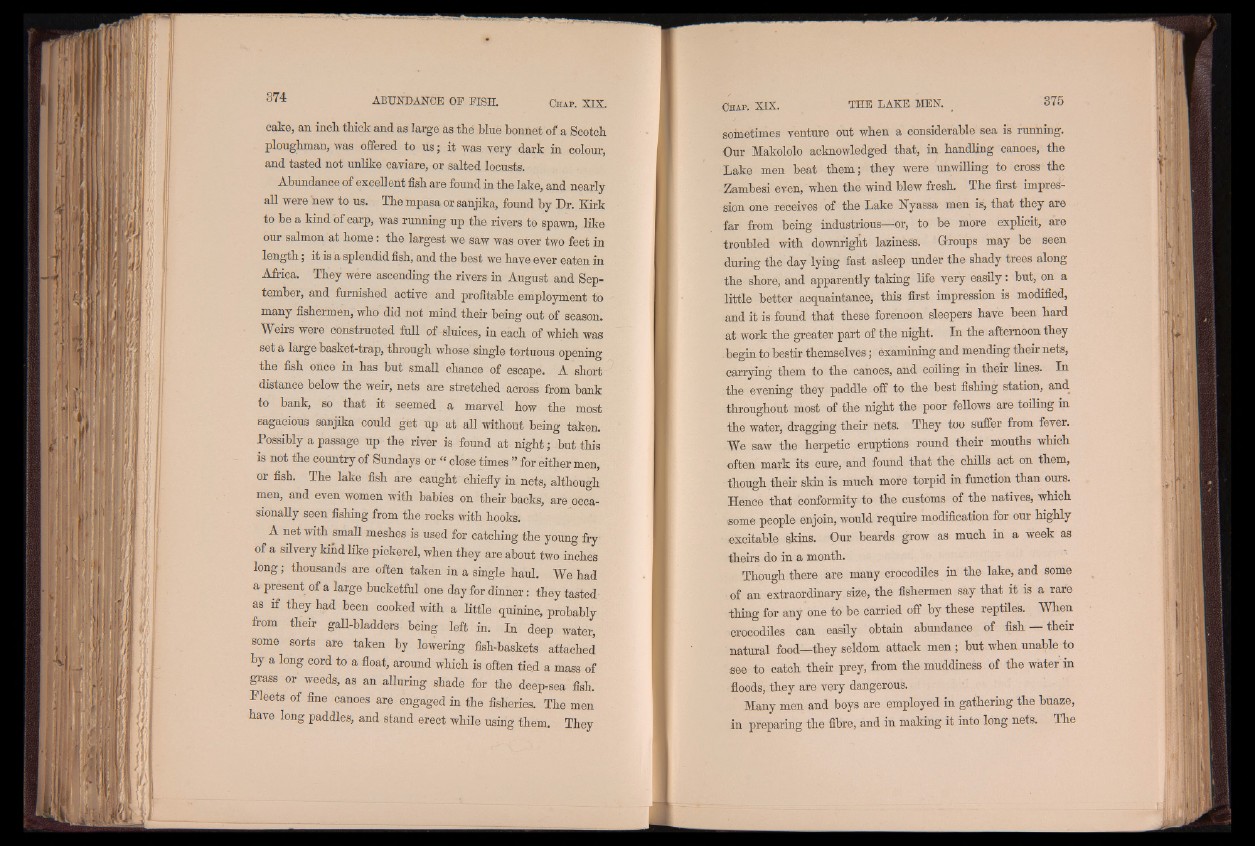
cake, an inch thick and as large as thé blue bonnet of a Scotch
ploughman, was offered to us ; it was very dark in colour,
and tasted not unlike caviare, or salted locusts.
Abundance of excellent fish are found in the lake, and nearly
all were new to us. The mpasa or sanjika, found by Dr. Kirk
to be a kind of carp, was running up the rivers to spawn, like
our salmon at home ; the largest we saw was over two feet in
length ; it is a splendid fish, and the best we have ever eaten in
Africa. They were ascending the rivers in August and September,
and furnished active and profitable employment to
many fishermen, who did not mind their being out of season.
Weirs were constructed full of sluices, in each of which was
set a large basket-trap, through whose single tortuous opening
the fish once in has but small chance of escape. A short
distance below the weir, nets are stretched across from bank
to bank, so that it seemed a marvel how the most
sagacious sanjika could get up at all without being taken.
Possibly a passage up the river is found at night ; but this
is not the country of Sundays or “ close times ” for either men,
or fish. The lake fish are caught chiefly in nets, although
men, and even women with babies on their backs, are occasionally
seen fishing from the rocks with hooks.
A net with small meshes is used for catching the young fry
of a silvery kind like pickerel, when they are about two inches
long ; thousands are often taken in a single haul. We had
a present of a large bucketful one day for dinner : they fasted-
as if they had been cooked with a little quinine, probably
from their gall-bladders being left in. In deep water,
some sorts are taken by lowering fish-baskets attached
by a long cord to a float, around which is often tie.d a mass of
grass or weeds, as an alluring shade for the deep-sea fish.
Fleets of fine canoes are engaged in the fisheries. The men
have long paddles, and stand erect while using them. They
soinetimes venture out when a considerable sea is running.
Our Makololo acknowledged that, in handling canoes, the
Lake men beat them; they were unwilling to cross the
Zambesi even, when the wind blew fresh. The first impression
one receives of the Lake Nyassa men is, that they are
far from being industrious—or, to be more explicit, axe
troubled with downright laziness. Groups may be seen
during the day lying fast asleep under the shady trees along
the shore, and apparently taking life very easily: but, on a
little better acquaintance, this first impression is modified,
and it is found that these forenoon sleepers have been hard
a t work the greater part of the night. In the afternoon they
begin to bestir themselves; examining and mending their nets,
carrying them to the canoes, and coiling in their lines. In
the evening they paddle off to the best fishing station, and
throughout most of the night the poor fellows are toiling in
the water, dragging their nets. They too suffer from fever.
We saw the herpetic eruptions round their mouths which
often mark its cure, and found that the chills act on them,
though their skin is much more torpid in function than ours.
Hence that conformity to the customs of the natives, which
some people enjoin, would require modification for our highly
excitable skins. Our beards grow as much in a week as
theirs do in a month.
Though there are many crocodiles in the lake, and some
of an extraordinary size, the fishermen say that it is a rare
thing for any one to be carried off by these reptiles. When
crocodiles can easily obtain abundance of fish — their
natural food—they seldom attaok men; but when unable to
see to catch their prey, from the muddiness of the water in
floods, they are very dangerous.
Many men and boys are employed in gathering the buaze,
in preparing the fibre, and in making it into long nets. The